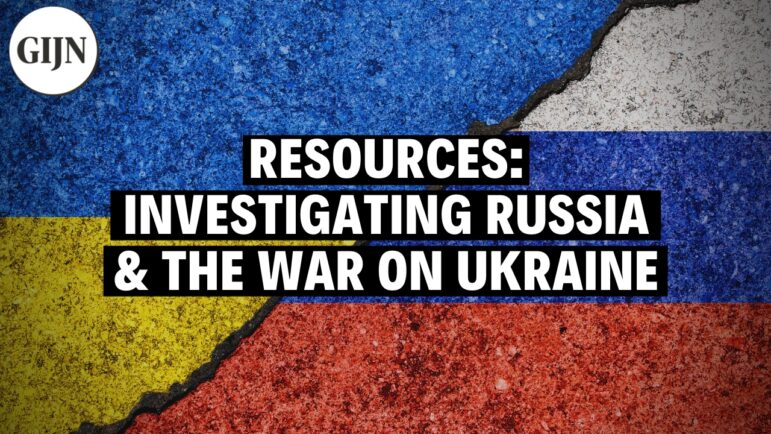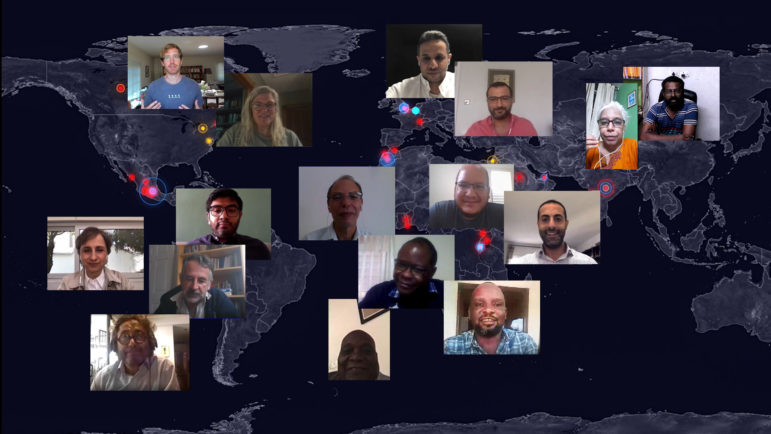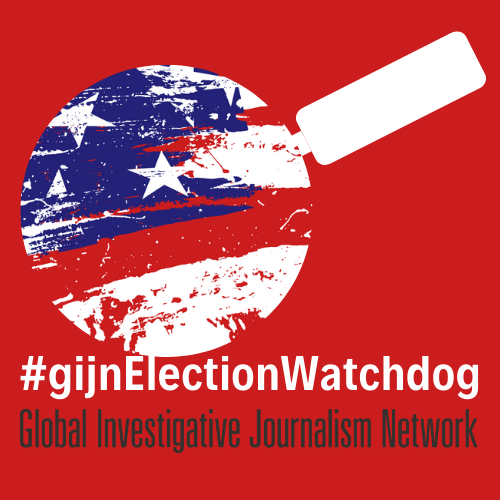

Covering the Extractive Industries
The extractive industries –the development and exploitation of oil, gas, and mining resources — is a critical topic for investigative journalists, particularly in developing countries. Revenues from natural resource extraction contribute substantially to GDP and in many cases make up the bulk of government revenue. The companies in the extractive sector are large and influential. How the revenues they generate are spent affects economic growth, the environment, domestic security, and social well-being. In many countries, however, revenues are wasted or lost due to corruption and financial mismanagement.
The Natural Resource Governance Institute (NRGI), a nonprofit headquartered in the United States, in late 2020 produced a reporting guide designed to help journalists interrogate the complex and lucrative extraction industries in their regions. Covering Extractives starts by explaining the process from exploration to extraction, what should happen to the money at various points along the way, and what to look for when prospecting a story. It also documents some useful case studies, from an Al Jazeera documentary that investigated the Operation Carwash scandal in Brazil to a cross-border investigation into missing money in Angola. (See GIJN article about it.)
Digging into the Extractives Industry was the topic for a panel at GIJNs 2019 conference in Hamburg (See all tipsheets here). Among the presentations was a list of questions to ask that could suggest a company is receiving undue advantage in a license award process, presented by Asmara Klein of the Natural Resource Governance Institute. Maurício Angelo of The Mining Observatory offered suggestions and examples.
GIJN’s collection of materials on covering extractive industries is based on a detailed guide: “Covering the Extractives Industry: Big Data, New Tools, and Journalism,” by Anya Schiffrin and Erika Rodrigues. Their paper was presented during the professors’ track at the Global Investigative Journalism Conference in October 2013 in Rio De Janeiro. GIJN updates this listing with new materials.
The authors presented another paper in 2015 at the Global Investigative Journalism Conference in Lillehammer, Norway, entitled “Digital technologies and the extractive sector: promoting journalism.” In it they critically examine reporting about extractive industries.
Fabiola Torres, the author of “Dirty Gold: Chasing the Trace of the London Gold Bullion Market,” made a presentation at GIJC17 on his investigation. The article’s subtitle is: “How we connected the illegal mining that is devastating the Amazon with the biggest gold dealers in world.”
There is a great deal of scope for journalists to do investigative reporting on the extractive sector. The last few years have seen a general trend towards transparency in the sector, so there is now far more data available than ever before. Indeed, the challenge will be for journalists to find the data and figure out how to make sense of it so it can be used for reporting in depth stories. Below, you can find a road map to improve your coverage, including new tools that enable journalists and bloggers to obtain and verify information, and where to get ideas for future stories.
Tools/Places to Get Information
Tools/Places to get information
In our research we found a wide range of websites that can be of use to journalists covering oil, gas and mining.
Sites with an extractives focus
- Covering Extractives by the Natural Resource Governance Institute (NRGI), is a 2020 guide designed to help journalists interrogate the complex and lucrative extraction industries.
- Thompson Reuters Oil and Gas Reporting Handbook: A comprehensive guide that explains some of the more complicated aspects of the oil and gas industry to help journalists report on the sector in a more effective and informed manner.
- Finding the Missing Millions: A 2018 Global Witness handbook for using extractive companies’ revenue disclosures to hold governments and industry to account.
- The National Oil Company Database: compiles information on the production, revenues and performance of 71 national oil companies. It is produced by the Natural Resources Governance Institute whose rich website also includes Resource Projects: that has data in payments made by companies for extracting oil, gas and mining resources around the world.
- ICMM: The international Council on Mines and Minerals cites its goals as “to bring together 22 mining and metals companies as well as 33 national and regional mining associations and global commodity associations to maximize the contribution of mining, minerals, and metals to sustainable development.”
- CEPMLP: The Centre for Energy, Petroleum and Mineral Law and Policy at the University of Dundee is a leading graduate school in the business, law, and policy surrounding mining, energy, and natural resource extraction.
- EI Source Book: An exhaustive primer on the oil, gas, and mining industries; affiliated with Goxi, the World Bank, and the University of Dundee.
- Open Corporates: “The open database of the corporate world,” containing information on over 60 million companies worldwide.
- OpenOil: An organization that fosters “progressive policy making” in the areas of oil and gas. Includes blogs, research, wiki-guides, etc.
- Academic Work from Michael Ross: For academic work on the effect that oil wealth has on development please see the website of this UCLA political science professor.
- ‘Covering Oil’ IJEC: A book the author helped edit in 2005 is aimed at helping journalists write about oil and it’s been translated into several languages and is available for free on the Revenue Watch website.
- Mineral Development Agreement Report: Global Witness has published a number of reports on the extractives, particularly in Africa. A few that are worth looking at include a report on the unfair Mineral Development Agreement between Liberia and Mittal which helped push the two sides to renegotiate.
- Fatal Extraction: A project by Code for Africa to gather and map “the human cost of Australia’s mining empire in Africa.”
- Double Offshore – A project of Code for Africa that shows “the connections between the companies that own and operate oil rigs, and how they are incorporated as companies in, or working through, maritime tax havens.”
- The Miners of Mozambique – A project of Code for Africa that shows the individuals behind the mining industry in Mozambique and their connections.
- ResourceContracts: A portal that houses over a thousand mining and oil contracts.
- Resourceprojects.org: A repository of extractives projects which includes payments to governments based on recent mandatory disclosure legislation in the EU, Norway, US and Canada as well as in EITI reports. ResourceProjects.org links project data to associated information such as project location and status, associated contracts, companies and licenses from a variety of government and industry sources.
- Twelve Red Flags: Corruption Risks in the Award of Extractive Sector Licenses and Contracts: a 2017 report by the Natural Resource Governance Institute.
- Brookings: The Leveraging Transparency to Reduce Corruption project (LTRC) in 2018 created an annotated bibliography of more than 150 books, papers, tools/datasets, and other resources addressing transparency, accountability and participation (TAP) efforts along the natural resource value chain.
Energy infrastructure and flows
- Joint Organizations Data Initiative (United Nations): A database measuring 13 product categories (crude oil, NGL, LPG, etc.) and 14 flows (production, direct use, stock change, refinery output, etc.) across over 90 participating countries, with data from 2002 to present
- BP Statistical Review of World Energy: Contains annual price, consumption, and production totals on oil, natural gas, coal, and other resources; updated yearly with statistics going back decades in some cases
- S. Energy Information Administration: A variety of tools for viewing historical, international energy data including production, consumption, imports, exports, capacity, stocks, emissions, etc. for all fuels and countries
- International Energy Agency Statistics: A comprehensive set of maps, graphs, and charts displaying energy production, consumption, imports, flows, etc. in a variety of interactive graphical formats on an individual country level
Revenue management and transparency
- EITI Country Reports: Contains data on revenues reported as paid by the companies, and as received by the governments, for the 37 countries that are part of the EITI
- Promoting Revenue Transparency: 2011 Report on Oil and Gas Companies (Revenue Watch / Transparency International): A report on transparency and anti-corruption efforts of 44 oil and natural gas companies from 30 countries (including country-level disclosures for all nations within their upstream production line, totaling 73 countries in all)
- Resource Governance Index (Revenue Watch): Data tool that facilitates country-by-country comparisons in transparency and accountability in the energy sectors of 58 nations, with sections on disclosure procedures for individual countries
- Similar comparative tool found here for EITI nations
- Oil and Gas Tax Guide for Africa 2013 (PricewaterhouseCoopers): Self-described as a “quick guide to oil and gas tax regimes” in Africa, this report includes tax and regulatory information on 14 African countries’ oil and gas industries
- Conflict Minerals Survey 2014 (PricewaterhouseCoopers): Compilation on reponses from700 stakeholders on their conflict minerals compliance preparation, progress, and challenges.
- Africa Oil and Gas Review 2015 (PricewaterhouseCoopers): Review of developments in the African oil & gas industry that “represents the experience and views of industry players across Africa, including international oil companies operating in Africa, national oil companies, oilfield service companies, independent oil companies and industry commentators.”
- Beyond the Rhetoric – Measuring revenue transparency: company performance in the oil and gas industries (Save the Children UK): An overview of transparency in the oil and gas sector, including a scoring system for revenue transparency and anti-corruption efforts for all major global oil/gas companies (and several smaller and/or state-owned ones) for a total of 52 country-specific operations
- Contract Transparency (Publish What You Pay): An interactive map showing countries that have published their contracts with extractive companies, accompanied by links to the contracts
- Contribution of natural resources to gross domestic product (World Bank): Table listing the percentage of GDP comprised of rents for oil, natural gas, coal, mineral, and forests
- Financial & Private Sector Development: Privatisation (World Bank): Tables listing historical privatization transactions of at least $1MM from 1988-2008, including 215 in the energy sector (with fields for company name, country, year, deal type, and proceeds)
- Resource Contracts (GEI Program / Revenue Watch / Columbia University): A database of contracts, agreements, and key terms containing 120 documents from 7 countries
- Payments to Governments (Shell Global): Contains data on income taxes, sales taxes, and royalties paid to host governments by Shell Global in 2011 and 2012
- Chad/Cameroon Development Project: Year-End Report 2012 (Esso Exploration and Production Chad Inc.): Reports on compensation paid to local actors (chapter 7) as well as revenues paid to the host country and what the money was spent on within the country (chapter 13)
- GlobeScan: Assesses industries based on perceptions and reputation.
- The Responsible Mining Index 2018: by the Responsible Mining Foundation.
Sites with information on arbitration processes and outcomes:
- Luke Eric Peterson is a journalist who is passionate about international arbitration and has been writing about the subject for years. He is also interested in bilateral investment treaties and human rights.
- Investment Arbitration Reporter:“ is a news and analysis service focusing on international arbitrations between foreign investors and their host governments.”
- Professor Andrew Newcombe: This website run by Professor Andrew Newcombe houses all publicly available notices of arbitration, pleadings, and awards, sortable by company claimant and respondent state.
- World Bank’s Center for Settlement of Investment Disputes: Identifies the relevant sector/industry at issue in the investor-State dispute.
- UNICTRAL: Recently adopted rules that will mandate transparency in investor-State arbitrations. The new rules are available at this site. We also did a write-up of these new transparency rules, explaining what they mean and when they will apply.
National Sites
- Sahara Reporters: “An online community of international reporters and social advocates dedicated to bringing you commentaries, features, news reports from a Nigerian-African perspective.”
- Guinée News: “Interested primarily in news and information concerning the Republic of Guinea. Also coverts African and international issues” (translation of “About” page).
- Soul Beat Africa: “A knowledge management initiative focusing on communication and media for social change in Africa.”
- @Verdade: “A high quality, full color newspaper distributed weekly to the Mozambican population, with an estimated print readership of 400,000.”
- Oil in Uganda: a website owned by Action Aid International Uganda, operating with funding support from Ford Foundation, with news and detailed information about the social, economic, governance and environmental dimensions of the oil and gas sector in Uganda. A quarterly print edition excerpts major content of the site, with some additional features.
- BudgIT: A website with “simple infographics that helped citizens to understand the new fuel subsidy payment and oil revenue share in Nigeria. The team has since produced a whole series of images that break down the country’s Budget by state and sector and utilize the power of social media to enable citizens to take part in more informed debates around public expenditure.”[1]Also an app for mobile devices.
- openAFRICA: A project of Code For Africa and “the largest independent repository of open data on the African continent.” Allows users to easily search by keyword for datasets.
Sites to connect people
- Ulula: A mobile platform designed to measure the impact of big business on the communities they inhabit and serve by analyzing “social, economic and environmental risk” and utilizing a big-data feedback structure to foster dialogue between businesses and citizens
- Goxi: A collaborative network inspired by the World Bank Institute and the African Development Bank that is designed specifically for extractives-related governance projects. Includes discussion of research, job searching, and task sharing for members in academia, business, government, nonprofits, and the media
- Investigative Dashboard: “Detailed methodologies, resources, and links for journalists to track money, shareholders, and company ownership across international borders,” with plans to include “more advanced collaborative workspaces, data-archives, and discounted…access to expensive or proprietary research services.”
- Ureport: Similar to LabourVoices.
- Connected Africa – A project of Code For Africa, this site visually shows connections among financial, political, and institutional connections in South Africa. Search by individual, institution, political party, or other.
- Factr: “Factr combines your own expertise and that of peers you trust, to filter that flood of data and deliver exactly.”
Innovation Related Tech Sites
UProxy: Developed by Google Ideas, allows users in places with safe, unrestricted internet access to share their connections through social networks with those in places with unsafe or restricted internet access.
Gkillcity: Digital citizen-journalist alternative news site of Ecuador.
Flash Cast: “FlashCast operates a network of location-aware, dynamically refreshing text displays installed in public transit vehicles. They leverage this novel technology to offer businesses of all sizes an affordable, powerful, geo-targeted channel to capture new business. They enable NGOs, government agencies, and social enterprises to broadcast vital information to a notoriously difficult to reach demographic.”
Citizen Desk: “A tool to help aggregate, verify and publish news reports from citizen journalists.”
Oxpeckers – Oxpecker’s Center for Investigative Environmental Journalism focuses on using geo-mapping and data analysis to track environmental crimes in Africa. You can also sign up to receive alerts on mining applications and licenses near/in your region through their #MineAlert website and mobile app.
Interesting/useful reading on oil, gas and mining
- Oil and Gas: A Reporter’s Handbook by Nick Pythian (published by Thomson Reuters)
- Covering Oil: A Reporter’s guide to Energy and Development edited by Svetlana Taslik and Anya Schiffrin (published in 2005 by Revenue Watch)
African Stories on Extractives:
- “How East Africa can avoid the resource curse” by Kennedy Opalo on African Arguments.
- “Unanswered questions on Nigeria’s missing oil revenue billions” by Lamido Sanusi in Financial Times
- “Inside the Oil Deals That Cost Nigeria Billions” by Jimi Disu on his blog
- “Missing’ $20billion Oil Money: Our audit report not reliable — PricewaterhouseCoopers” by Jonathan Elendu on Elendu Reports
- “The role of Extractive Sector in Africa’s Industrial Transformation” by Isabelle Ramdoo on ecdpm
- “The Diamond Connection” by Tshireletso Motlogelwa in Zam Magazine
- “Angola After Oil” by Gustavo Costa in Zam Magazine
- “Wild Coast mining conflict: Xolobeni escalates” by John Clarke in Daily Maverick
- “South Africa’s sick miners take gold mines to court” by Thuso Khumalo on Deutsche Welle
- “Oil and gas need not be a curse, they can provide a lifeline for previously poor countries” by Mark Suzman in The East African
- “Oil Thieves of the Niger Delta” by Alexis Okeowa in Bloomberg Business
- “Dirty Diggers: A Citi News report on mining in Upper West Region” on Citi FM Online Ghana
Stories on Extractives in Africa by Foreign Journalists:
- “After Marikana, Little has Changed for Miners” by Tendai Marima on Al Jazeera English
- “I Remember the Day an Oil Spill Changed my Life” by Femke van Zeijl on Al Jazeera English
- “How Dodd-Frank is Failing Congo” by Lauren Wolfe on Foreign Policy
- “Clear as Mud” by Jamlia Trindle on Foreign Policy
- “Oil and Gas: Libyan Promise Falters” by John Hamilton in African Report
- “For Ghana Timing is Everything” by Patrick Smith in The Africa Report
- “Gas: Waste not, want not” by Thomas Pearmain in Africa Report.
- “Why Angola’s Star Reporter Won’t Stay Down” by Daniel Metcalfe in Foreign Policy
- Blue Dahlia, Black Gold (book) by Daniel Metcalfe (2013).
- “Ghana’s Gold-Mine Arrest, China’s Latest Headache in Africa” by Fei Wang in Foreign Policy
- “Extreme City” by Michael Spector in The New Yorker
- “Election worries put new Kenya Oil, gas investment on hold” by Kelly Gilblom on Reuters
- “China in Africa: How Sam Pa became the middleman” by Tom Burgis in Financial Times
- The Looting Machine (book) by Tom Burgis (2015)
- The Secret World of Oil (book) by Ken Silverstein (2014)
- “Buried Secrets” by Patrick Radden Keefe in The New Yorker
- “The Price of Gold – Chinese Mining in Ghana” (video) directed by Richard Cookson in The Guardian
- “Corruption is Killing Children in Angola” by Nicholas Kristof in The New York Times
Academic/Institutional Papers and Reports on Extractives:
- “Regulating Extraction in Africa: Towards a framework for accountability in the Global South” by Hany Besada, Franklyn Lisk, Philip Martin
- “Beyond Bribery: Rethinking the Form of Corruption in Sub-Saharan Africa’s Extractive Industries” by Tracy Emilie Nanziri
- “The Anatomy of the Resource Curse: Predatory Investment in Africa’s Extractive Industries” ACSS Special Report
- “Beating the Resource Curse in Africa: A Global Effort” by Terra Lawson-Remer, and Joshua Greenstein. Council on Foreign Relations
Ideas for Future Stories
The number of stories that can be written about the extractive sector is infinite. Based on our reading and interviews with experts, activists and journalists here are a few:
1) The Dodd-Frank Act
The effect of Dodd-Frank Wall Street Reform and Consumer Protection Act on the transparency of extractive companies. Section 1504 and the rules associated with it would require oil, gas and mining companies to make detailed reports of the payments they make to governments around the world.
- According to the Revenue Watch Institute, “Under the SEC’s final rules, companies must disclose taxes, royalties, fees, production entitlements, bonuses, dividends and payments for infrastructure improvements. Fees to be reported include rental fees, entry fees and concession fees; bonus payments are specified to include signature, discovery and production bonuses.” In July 2013, the rule that would implement 1504 was vacated by a Washington DC District Court but this was appealed so at this writing, we are still waiting for the SEC to issue a new version of the rule. This is now expected to happen in March 2015. For more information see this May 28, 2014 article on Reuters. A number of groups have called on the SEC to come back with a stronger set of rules. Oil companies have said they prefer voluntary agreements
- What effect Dodd Frank will and will not have around the world will be an important subject for reporters. For example by looking to see what payments companies do not report it may become clearer what companies are paying in taxes or not paying and to compare the corporate tax regimes of different countries. These subjects will lend themselves to data visualization.
- It is worth noting that the oil companies that have opposed the bill do not object to reporting overall payments. They simply resist reporting payments with the kind of detailed breakdown that would make such information useful, especially for purposes of investigative reporting.
- Section 1502 of Dodd Frank requires companies to was upheld by the US district court in July 2013 but then only partially upheld in April 2014 by the court of appeals and in In April 2014, two SEC Commissioners spoke out against the rule. At this time, it is not clear what will happen. For more information please see Reuters coverage as they are following events closely in Washington.
- 1502 is the provision that relates to conflict diamonds. To quote a PWC report
- “On May 31, 2014, public companies will have to comply for the first time with the SEC’s Conflict Minerals Rule (“the rule”) filing requirement. The rule is one of several SEC rules mandated by the Dodd-Frank Act that are intended to provide transparency into corporate practices. Specifically for the conflict minerals rule, the ultimate intent is to reduce funding for armed groups involved in human rights violations in the Democratic Republic of the Congo and surrounding countries (collectively, “covered countries”). The rule compels corporate disclosures around whether the conflict minerals used in a company’s products originated in the covered countries, and whether the conflict minerals are “conflict-free” or not.
- Law professor Peter Rosenblum notes that Dodd Frank only requires transparency on financial dealings but not environmental damage. Again, another subject for investigation.
2) Corporate Spending
There is a tremendous need for follow up stories about the questions of what the extractive sector companies are actually spending in the countries where they work. Extractive sector companies pledge to spend a certain amount on, say, community projects but there is little analysis of whether this actually happens.
Related to this is the Lough Erne declaration released at the G-8 meeting in June 2013, which read in part “Governments should publish information on laws, budgets, spending, national statistics, elections and government contracts in a way that is easy to use and re-use, so that citizens can hold them to account.”
- Open data charter –This is a g-8 policy paper which endorses many key principles of transparency and of the open data movement.
3) Arbitration
A second set of possible set of story ideas has to do with the international and national arrangements on arbitration.
- Tension over whether bilateral investment treaties are undermining national sovereignty. South Africa under pressure from the EU.
- Another source is the Third World Network. This paper includes a discussion on how Canada’s bilateral investment treaties (BIT) maintain an “existing imbalance of bilateral and global economic and political relations between the north and the south, particularly Africa.” This paper here, from Emory Law Journal, is less critical of BITs and suggests about some of the sub-Saharan treaties should be formulated.
- The unfairness of international arbitration and the way companies use the threat of arbitration to do what they want. Local groups in, say, land disputes have nowhere to appeal if their home court rules against them. Large corporates have the option of international arbitration—a process that has always been shrouded in secrecy—is expensive and drags on for years.
- Increasing transparency in the rules governing arbitration will continue to provide fodder for journalists seeking information. Ongoing changes to arbitration rules will affect treaty based investor-state arbitration. This will, in turn, affect companies in the extractive sector as so many of them use arbitration proceedings that have, in the past, been completely closed to public scrutiny.
- A source who researches arbitration outcomes and can speak with journalists about investor-state disputes and arbitration is Lise Johnson at the Vale Center at Columbia University’s Law School.
4) Other Story Ideas
- Mexico and the opening up of Pemex to foreign investment. Mexico is one country that has not allowed foreign companies in the hydrocarbon sector. But the inability of the national oil company to develop the countries oil and gas fields combined with dwindling output from existing fields has put pressure on the country to open up the sector. At the same time, abuses elsewhere are putting pressure on the government to make sure it sets up a legal framework that will ensure that such problems do not occur in Mexico. Ideally, the framework should ensure that Mexico get the full value of the resources and that the resource rents are used for public purposes.
- How the campaign being led by Chris Taggart from Open Corporates will affect extractive sector companies in the regions where you report. As well as giving each company an identifier, Taggart is mapping networks between the companies.
- Countries such as Azerbaijan are marking the anniversary of their joining or complying with EITI standards. This provides a great peg for stories that go beyond the rhetoric to look at the facts of what has been accomplished and what has truly changed.
- Forward looking pieces – Countries such as Azerbaijan are drawing down their reserves and saddling future generations with enormous costly building projects. Once the resources have been used up and the money spent what will the economies of these countries looks like? What are the prospects for future generations?
- Afghanistan and South Sudan and how the extractive sector will be developed there.
5) Perennial Story Ideas
As well as the above story ideas with more timely news pegs there are the perennial stories that are often neglected because the sites of extraction are remote and often closed to visitors. These include:
- Economic consequences in remote, underdeveloped areas that lead to even more severe poverty – inflation; capital-based big businesses coming to compete with small local businesses; companies bringing in foreign services and goods to the detriment of local and national economy; high influxes of population.
- Resettlement of populations living near sites of extraction to poor areas with no access to infrastructure, water, schools, health centers, and jobs.
- Effects on social fabric – such as increased tensions, crime, prostitution because of high influx of foreigners, drugs, etc.










